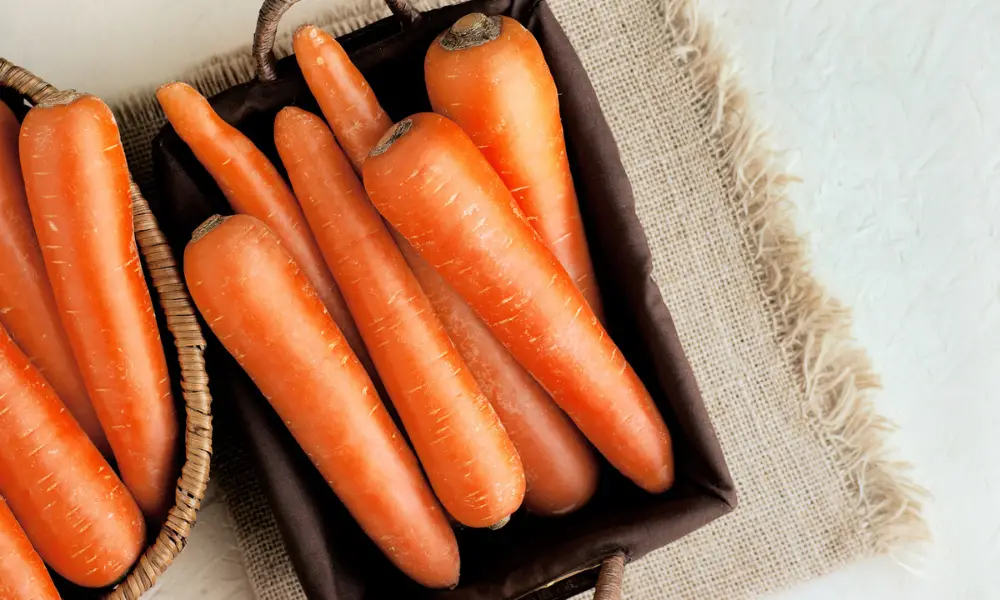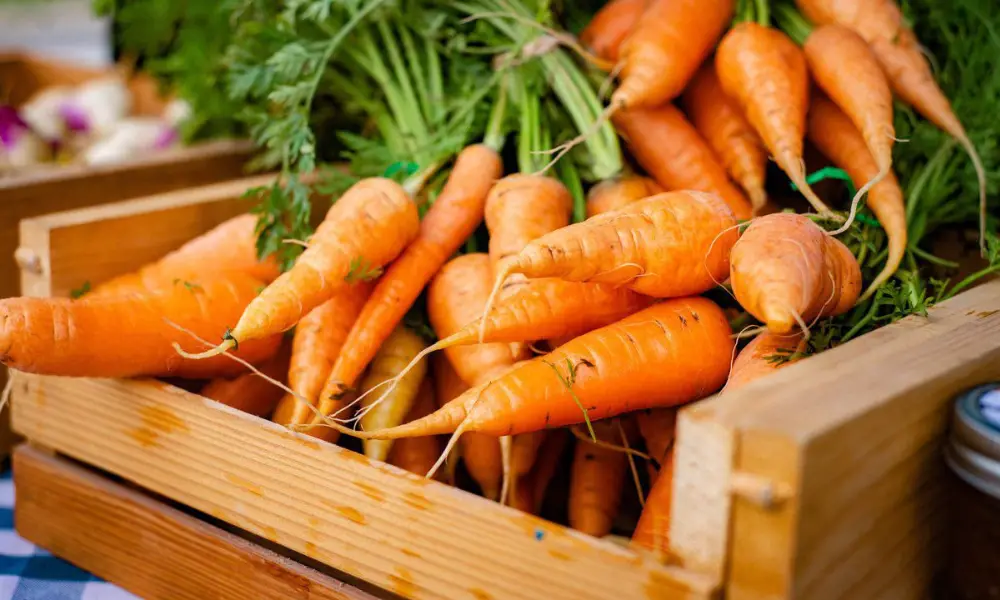Cooked carrots and shredded carrots last about 4-5 days in the fridge. For longer shelf life, store them in an airtight container. You can also freeze them for later use. Just remember to blanch or cook them before freezing. This makes them easy to thaw and use in a recipe.
Carrots have a short shelf life because of the ethylene gas they produce. This gas speeds up the ripening and rotting process. They are also susceptible to mold growth if stored in plastic bags. However, there are some simple methods for storing carrots for longer periods.

How Long Do Carrots Last in the Fridge
Depending on the temperature, fresh whole carrots last in the pantry for around 3 to 5 days. They last between two and four weeks in the refrigerator, depending on how you store them. While cooked carrots and any meals containing them keep for only three to four days, sliced carrots can last for one to two weeks.
You must give your carrots some water to extend their time in storage. Because of this, they only last for approximately 2 weeks if you simply throw them in the crisper drawer. However, if you wrap them in a wet paper towel or soak them in water, they last for around 3 and 4 weeks, respectively.
That is applicable to both whole carrots and carrots that have been minimally processed (such as sliced or cut carrots, which nevertheless have a two-week shelf life). I go into greater depth about this in the storage section.
What are the Benefits of Carrots for Health?
The popular Apiaceae root vegetable known as the carrot is quite adaptable. You can eat it raw as a snack or in a salad, stew it for soups and sides, or bake it for dessert. Despite the fact that most of us remember carrots with their vibrant orange color, they were once yellow and purple in color.
However, the stem and leaves are also edible and eaten as herb or salad leaves in many parts of the world. The root is the part of the plant that is most commonly consumed. In the Western diet, carrots are a vital source of dietary carotenes and a large supply of the vitamin A that humans need.
Carotenoids from Dietary Sources
The part of carrots that humans enjoy eating the most, the root, is rich in plant compounds called carotenoids. Beta-carotene, sometimes referred to as pro-vitamin A since it is transformed into vitamin A in our intestines, makes up around 80% of the carotenes present in carrots. Most of these carotenoids are located in the flesh or outside the region of the root rather than the core. The ancient wives’ tale that suggests eating carrots will help one see in the dark has some merit because carotenoids are essential for vision.
Carotenoids also strengthen mucosal membranes in vital areas like the respiratory system and help maintain a healthy immune system. They are also good for skin health and anti-aging.
Interestingly, roasting, baking, griddling, or microwaving carrots can increase, or at least preserve, their carotenoid concentration. You can absorb significantly more pro-vitamin A if the food is puréed and consumed with a little fat or oil.
May Promote Heart Health and Cholesterol Balance
Carrots have heart-healthy qualities because they include fiber and advantageous plant substances like carotenoids and vitamin C. Particularly carrots have a tendency to help regulate cholesterol absorption, which could improve cholesterol balance.
However, a lot of this information comes from studies on animals, and more human trials are needed to show the benefit of protecting the heart.
May Aid in Weight Loss Objectives
Research suggests that eating carrots, which are low in calories and a rich source of fiber, may make you feel filled and fuller. However, other weight-loss methods, like the very low-carb diet plans, advise against eating carrots because they are higher in simple carbs.
This method ignores the other health advantages of carrots, such as the fact that when eaten whole, the structure, fiber, and high water content of carrots serve to curb cravings, and their inherent sweetness may encourage people to consume fewer other sweets.
Reference: Nutritional and health benefits of carrots and their seed extracts
Is it Safe to Eat Carrots Every Day?
Is it okay to eat carrots every day? When eaten in moderation, carrots are good for your health. Carotenemia, a condition, can develop if you consume too many carrots. This is used to describe a yellowish tinge on the skin that results from the buildup of the chemical beta-carotene, which is present in carrots.
Nutrients that are good for one’s health are abundant in carrots. Antioxidants are among them; they may guard your cells against harm and keep you free of conditions like cancer and heart disease.
Vitamin A, which is important for the health of the eyes, is abundant in carrots. Carrots are rich in fiber, vitamins, and minerals that are good for your health. However, beta-carotene, the compound that gives carrots their bright orange color and is a precursor to vitamin A, is not the only reason eating too many carrots might have negative effects. Blood carotene, which can result in skin coloring, is not the only factor that might cause this.
How Do Carrots Work?
Orange-colored carrots are a type of root vegetable, but there are also purple, black, red, white, and yellow variations that are domesticated versions of the wild carrot, Daucus carota, which is indigenous to Europe and southwestern Asia.
It is believed that the plant originated in Persia, where it was first cultivated for its leaves and seeds. The plant’s taproot is the part that is most frequently consumed, although the stems and leaves are also eaten.
The cultivated carrot’s taproot has undergone rigorous development to become considerably bigger, more palatable, and less woody in texture.
The taproot of the biennial carrot plant, which belongs to the umbellifer family Apiaceae, grows in tandem with a rosette of leaves. Slower-maturing cultivars take an extra month to achieve maturity compared to fast-growing cultivars, which take three months (90 days) from sowing (120 days). The roots have a lot of alpha- and beta-carotene and are a rich source of vitamins A, K, and B6.
What to Look For in a Bad Carrot?
Look
Dark stains may appear on some carrots. They can be snipped off before usage if they aren’t usable, so this doesn’t necessarily mean something is wrong.
If you see mold growing on them, they’ve probably gone bad and need to be thrown out. Do not remove the mold because its roots are deep.
A Pale Blush
Have you ever noticed that the white lines on your carrots are there? White flush is the term for this. It consists of a thin covering of dried carrots.
It appears when the outer layer of the carrots’ skin dries up after being exposed to air. Your carrots are still considered safe to eat even if they only have a few white lines on them. But keep in mind that a white flush means your carrots are likely to go bad, so consume them as soon as you can.
It is best to discard carrots that have a lot of white lines on the surface.
Check for Consistency
Examine the carrot for a greasy coating or a mushy texture in any of its parts.
Components
If it does, throw it away immediately. Consuming sluggish or rotten carrots may cause a number of health issues.
Consider examining the carrot’s size and thickness as well. Throw it out straight away if it’s already a little smaller than it was originally.
Smell
Your decaying carrots will smell bad because of bacteria that have begun to thrive inside the carrots. Examine the smell of your carrots, and discard them right away if they have a weird smell.
Look at the carrot’s skin for any spots. Is the surface covered in any white spots? If carrot spots are darker in color, eating them might not be safe (darker than white blush). Please don’t cook it; just throw it out.
What are Carrots’ Negative Effects?
Although eating carrots is generally viewed as safe, some people may experience adverse effects. Your skin may also become yellow or orange if you consume too much beta-carotene, although this is perfectly harmless.
Allergy
One study found that up to 25% of patients with food allergies may experience allergic reactions related to pollen after eating carrots. The allergic reaction to carrots is an example of cross-reactivity, in which certain fruits or vegetables’ proteins produce allergic reactions because they are identical to pollen’s proteins. If you are allergic to birch pollen or mugwort pollen, carrots may make you sick.
As a result, your mouth can tingle or itch. Some people may get throat swelling or a severe allergic reaction as a result (anaphylaxis)
Contamination
Heavy metal concentrations may be higher in carrots grown on contaminated soil or close to contaminated water, posing a risk to their safety and quality.
How Many Carrots Can I Eat in a Day?
Dermatologist Melissa Piliang claims in a Cleveland Clinic article that taking between 20 and 50 milligrams of beta-carotene every day for a few weeks could turn you orange. This is comparable to eating three to ten carrots every day. Eating around ten carrots per day for a few weeks might result in carotenemia, which is brought on by beta-carotene buildup in the skin. In order to benefit from several fruits and vegetables, including carrots, without suffering any bad effects, you must consume them in moderation.
Bright orange carrots are a nourishing addition to any diet. They have little calories, no fat, and a lot of particular vitamins and minerals. Carrots have a moderate flavor that makes them a flexible way to add nutrition to a variety of foods, even though they are good on their own.
Conclusion
Shredded carrots can be stored in the fridge for a couple of days or frozen for longer storage. When freezing them, be sure to remove the peel and place them in an airtight container or freezer bag. Shredded carrots can last for several months in the fridge or freezer. Keep in mind that carrots should be stored at 40° or below.
Carrots are sensitive to ethylene, a gas that’s produced by certain plants. They tend to spoil sooner than other products, so they must be refrigerated to maintain their freshness. Carrots should be cut from the greens before storing, since the greens will draw moisture from the root, causing it to become soft and shriveled. Greens should be stored separately in a paper towel and should last two to three days before becoming slimy.
